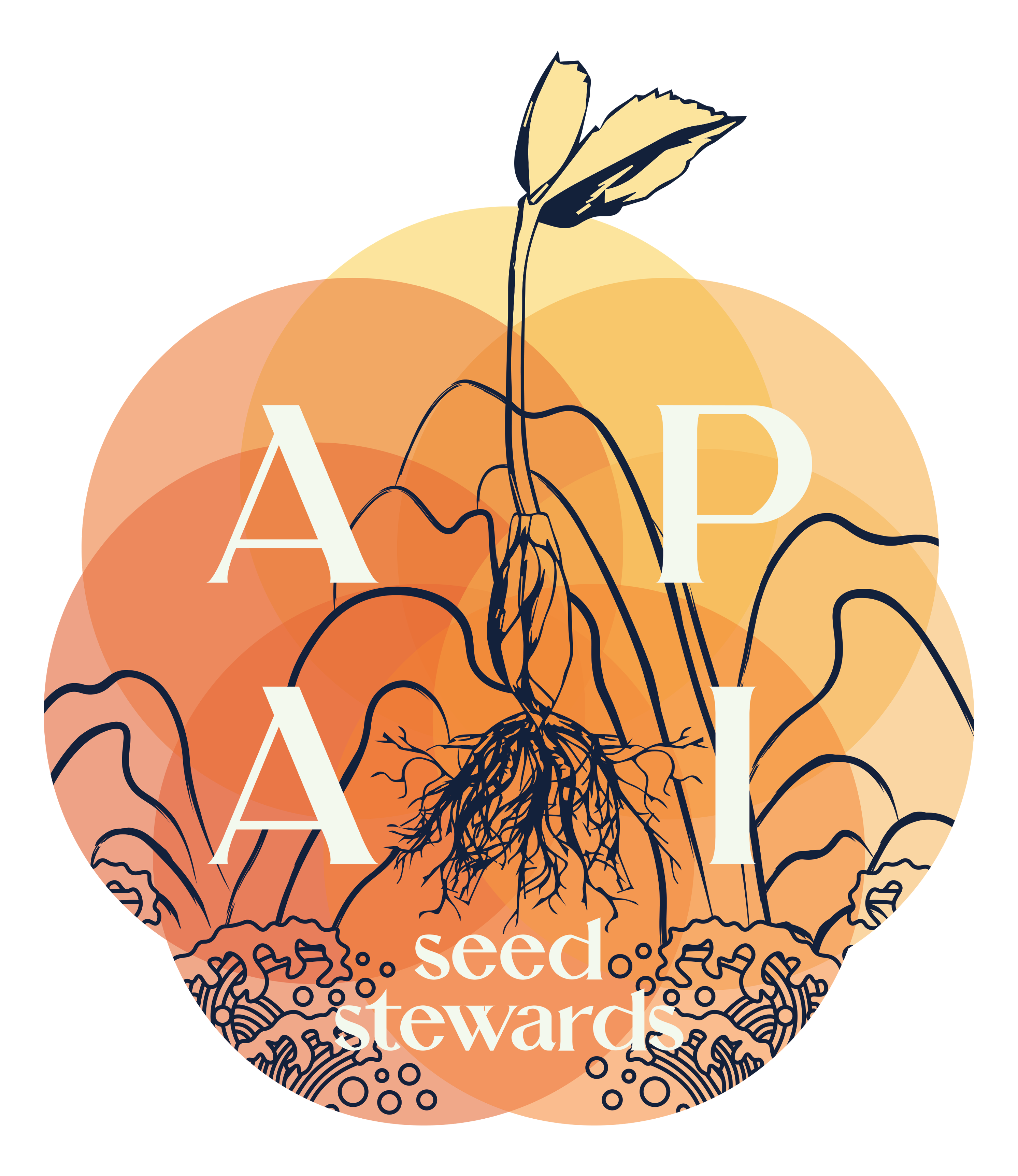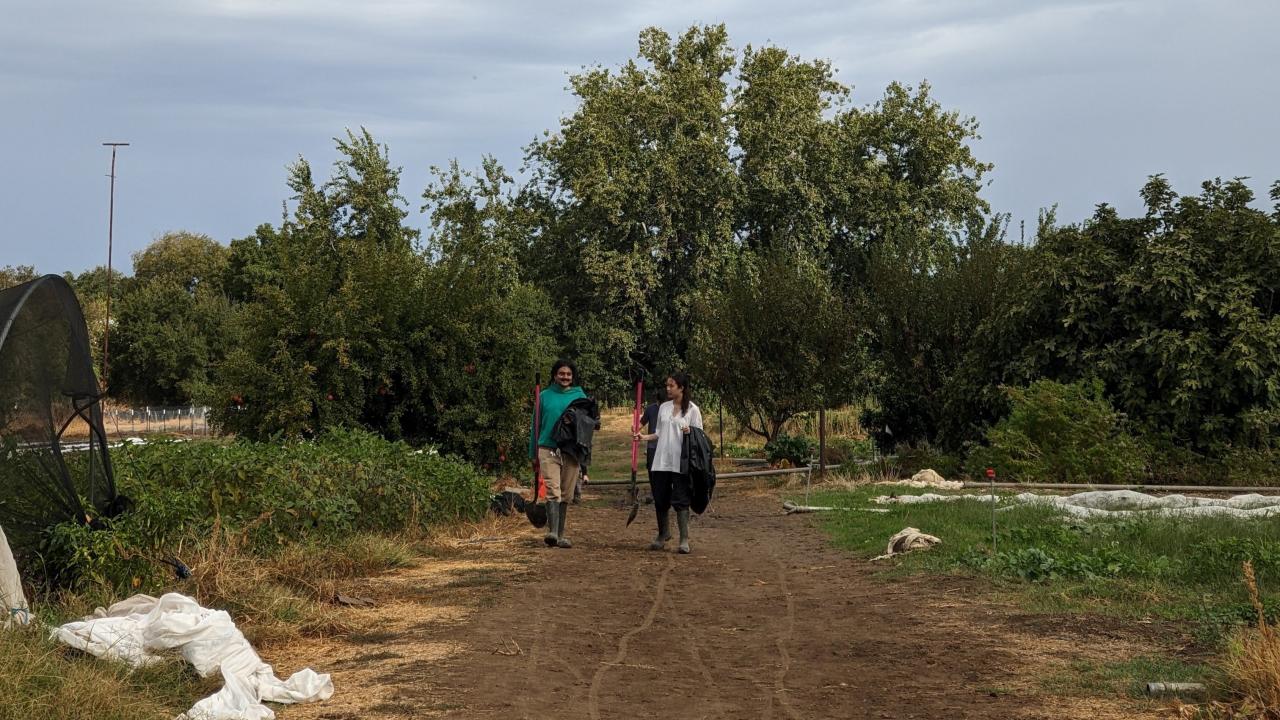
Student feature: Emma Nguyen's experiences with seeds and agriculture
Emma Nguyen is a third year undergraduate student majoring in Community and Regional Development and Asian American Studies with minors in Public Health and Plant Sciences. She is an intern for the Student Farm’s Fresh Focus Program as of 2024-2025, and she enjoys making pickles with some of the produce she gets from the student farm. Starting Summer 2025, she will be a Lead Student Farmer at the UC Davis Student Farm.
In this conversation with Emma, I was volunteering alongside her in the student farm’s Market Garden harvesting cilantro. I asked her, "What do seeds mean to you?" very broadly, and we expanded from there to talk about both meanings of seeds and contemporary issues in Asian American farming from her perspective.
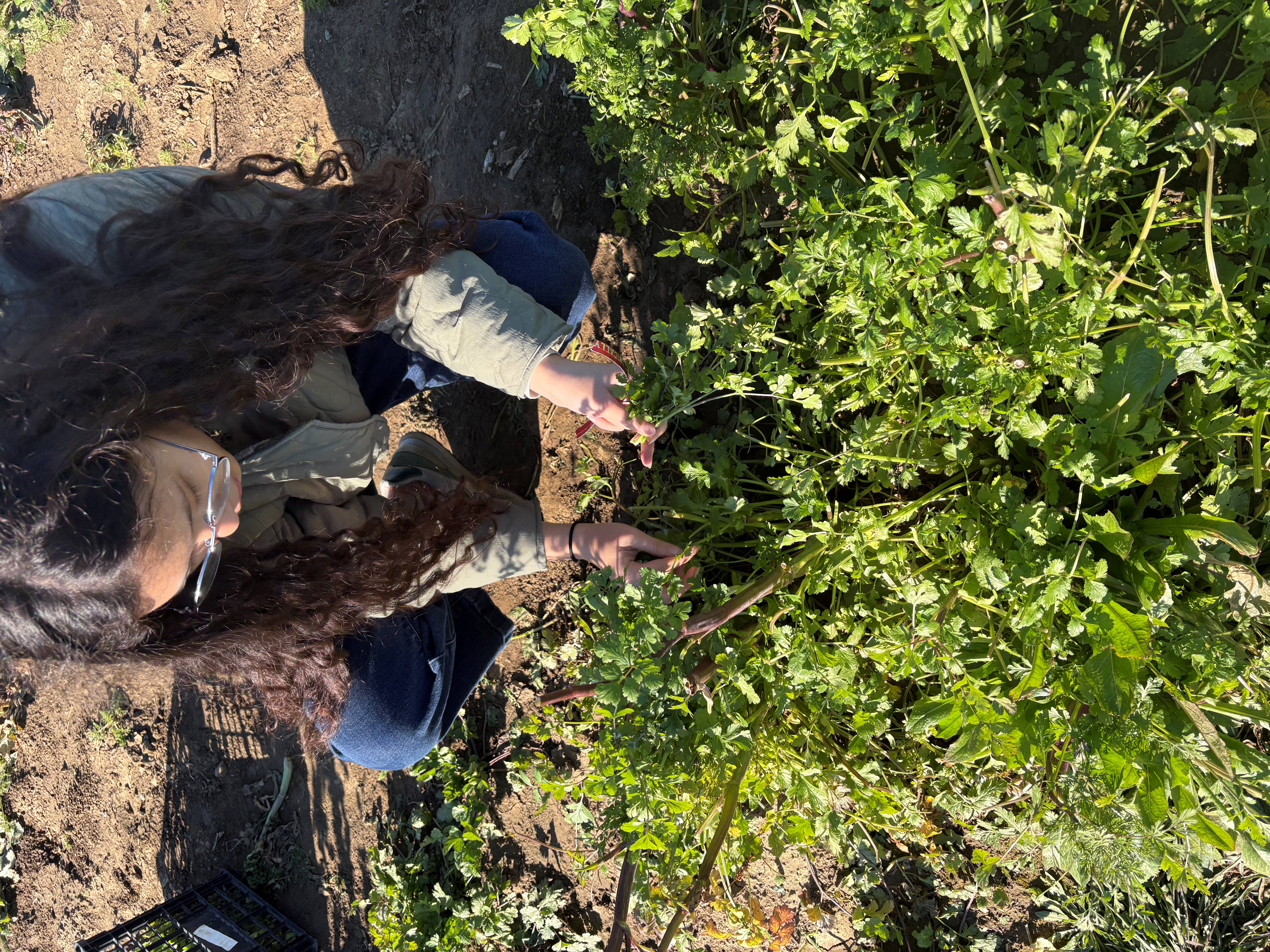
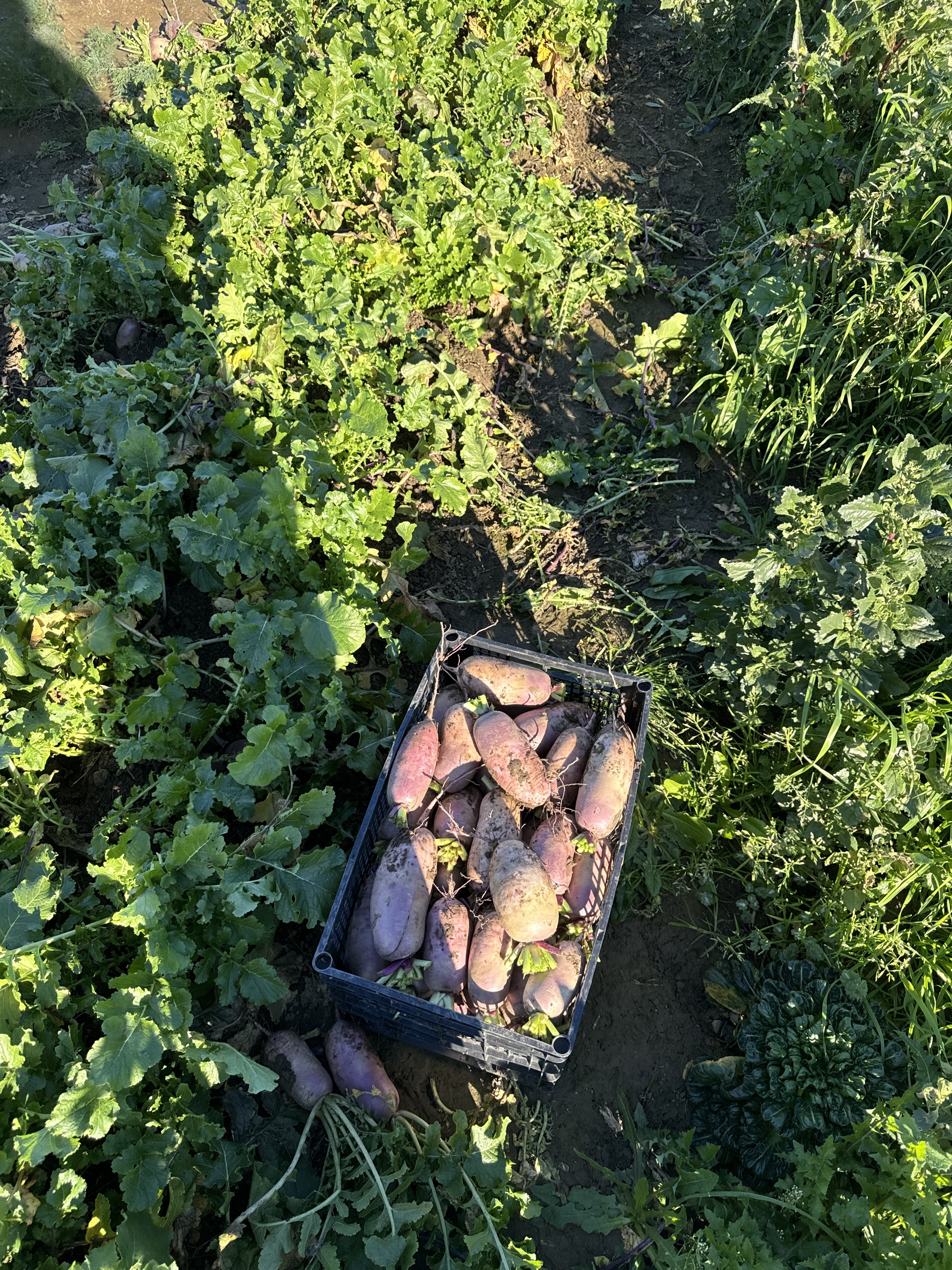
Q: What's your earliest memory of touching plants? Being engaged with plants, gardening, or farming, or knowing about it?
"My grandma used to be really into planting daffodils, because they were this really nice shade of yellow that looked like the same flower, [Hoa Mai]...people plant around their houses [in Vietnam], and the daffodil was a good replacement, because, I think at the time I was conscious for, that they weren't really bringing that flower over to the States. You might even know it because it's everywhere...they're even in Trader Joe's right now- I was weirded out that they're in Trader Joe's. She would tell me, ‘Oh this flower I had back home.’ That was also my first conception that my family wasn't from here... [I was] in elementary school."
Seed saving
Seed saving means different things to people. For Emma, it’s been a way of creating or maintaining a connection. Seed saving was an interesting topic to Emma because it’s something that has existed in her life without the name to it that she’s been introduced to in college.
“My mom and her mahjong friends have been doing it for the past 20 to 30 years, just casually, because they're trying to make the spiciest Thai chili pepper possible, which has been really funny. If you want the chili pepper to be spicier, you need to have more seeds, so basically, we've been breeding to have more seeds. It's also weirdly thick. I feel like it's not even Thai chili anymore. It's become something different, because they're bigger than the usual, but they originated from a Thai chili. It's been changing colors over the years. It used to be red and then it turned black, and now it's back to red and I don't know what's happening anymore. I wish we kept track of it. We've taken little photos, not great photos, but I wish we knew to track that. But even if we didn't track that, like, just the way the chili pepper has ended up now, that in itself, is a story...[that] seeds migrate just as much as people.”
“That's the main reason my mom stayed in contact with her mahjong friends, who all immigrated as refugees from Vietnam at the same time, had a competition amongst their families over who had the spiciest chili pepper. And so, when they came to Kansas and other states, they were mostly sponsored by the same church, and they had this idea, ‘You know we should find a Thai chili pepper, and we should restart our competition.’ And so as they moved throughout the US, my mom stayed in Kentucky for a little bit where I was born, and the rest of them went to San Jose,...they like started growing their little Thai chili peppers in their little Ziploc bags, and they've been just carrying it everywhere they went to. Then they all eventually settled in San Jose, where, for the past 20 years, this chili pepper competition has been going since Kentucky, [and] the idea started before, in Kansas, and sometime around when I was born, they started doing their little competition. They just carried their happiness over. They don’t even like spice, because the way you're supposed to have the Thai chili peppers, when you're eating something like a spring roll, you supposed to bite into it. What is the point if you're, like, dead [from how spicy it is]? It's so spicy to the point where I can't really taste anything. The kids taste test them, and it's a miserable experience, just biting straight into the chili pepper, and you can’t differentiate, it’s all spicy. I feel like when we talk about war and the refugee experience, we don't talk a lot about the happiness that we ended up bringing over and foster...I hope we can start talking about the whole refugee experience."
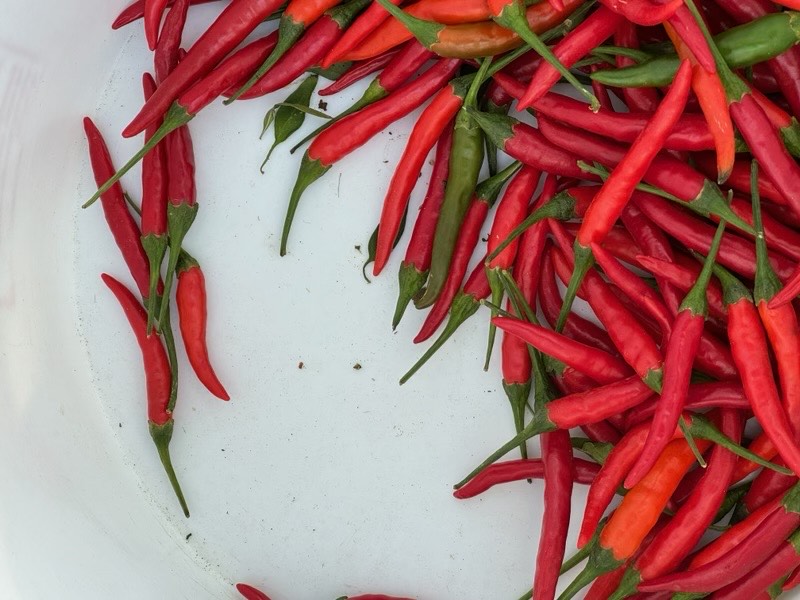
While seed saving is talked also about in scientific ways today in plant breeding, to Emma, from the way it started, it's always been a community practice with soul. But she understands a goal to bring the importance of seed saving to everyone, which she had experience being part of a workshop for the 2025 Semillas y Culturas - Seeds and Cultures summit.
Asian American farming and labor experience
Emma also has gained exposure to farming through her uncle's farm in Canada which included raising animals and using stun guns. Spending time there last summer with her hands on, she learned more skills, including how to do drip irrigation, and she would like to learn more still. Even with her involvement now at the student farm, growing plants is a recent new experience for her. She was not physically involved with plants growing up, but would just watch it from her aunts, grandma, and mom. “It feels nice to have my hands on it now, because it used to be, how are these plants changing from this to that? And recently, I've been learning a lot of lessons from the plants, like you have no control of when something will leave you. Because that's how crops are: things suddenly change, sometimes they're just going to die. They are just going to die, and you have to accept that. You’re left to adapt around it.”
What Emma worries about in Asian American farming is partly that there are not a lot of Asian American farms as it’s difficult to begin one, and that the way some Asian American farms have started, often by being lower class workers on white Americans’ land, raise critical questions.
Emma talks about her emotional weight of being in the farming space and sometimes wishes she would just focus on her studies, because growing up, she developed the sense that agriculture was something she wanted to escape from, when she first went to her uncle’s farm in middle school. “Seeing what you’d go through [as a farmer], I thought, yeah, I don't know if I would want this to be every day of my life, because the neighbors were mean to him, his life is hard, he faces all sorts of back problems, and skin issues because farmers get skin issues, so that wasn't really what I envisioned for myself,” she said.
However, Emma acknowledged that the farms here have more resources than her uncle does and recognizes that the reason her uncle began the farm is related to wanting to have control over growing food to be like from his homeland.
When asked if she has a dream food system, she did not know. Emma said that it was hard to think about food systems without thinking about the responsibility to sustain and fulfill the wants and needs of other people, and hard to think through the costs and what would need to happen for an ideal world. “It’s hard to dream these days. I often get those questions in Asian American studies [too], like what is your ideal world,” she said. “You know, in agriculture, I think a good person would be someone who is able to dream.”
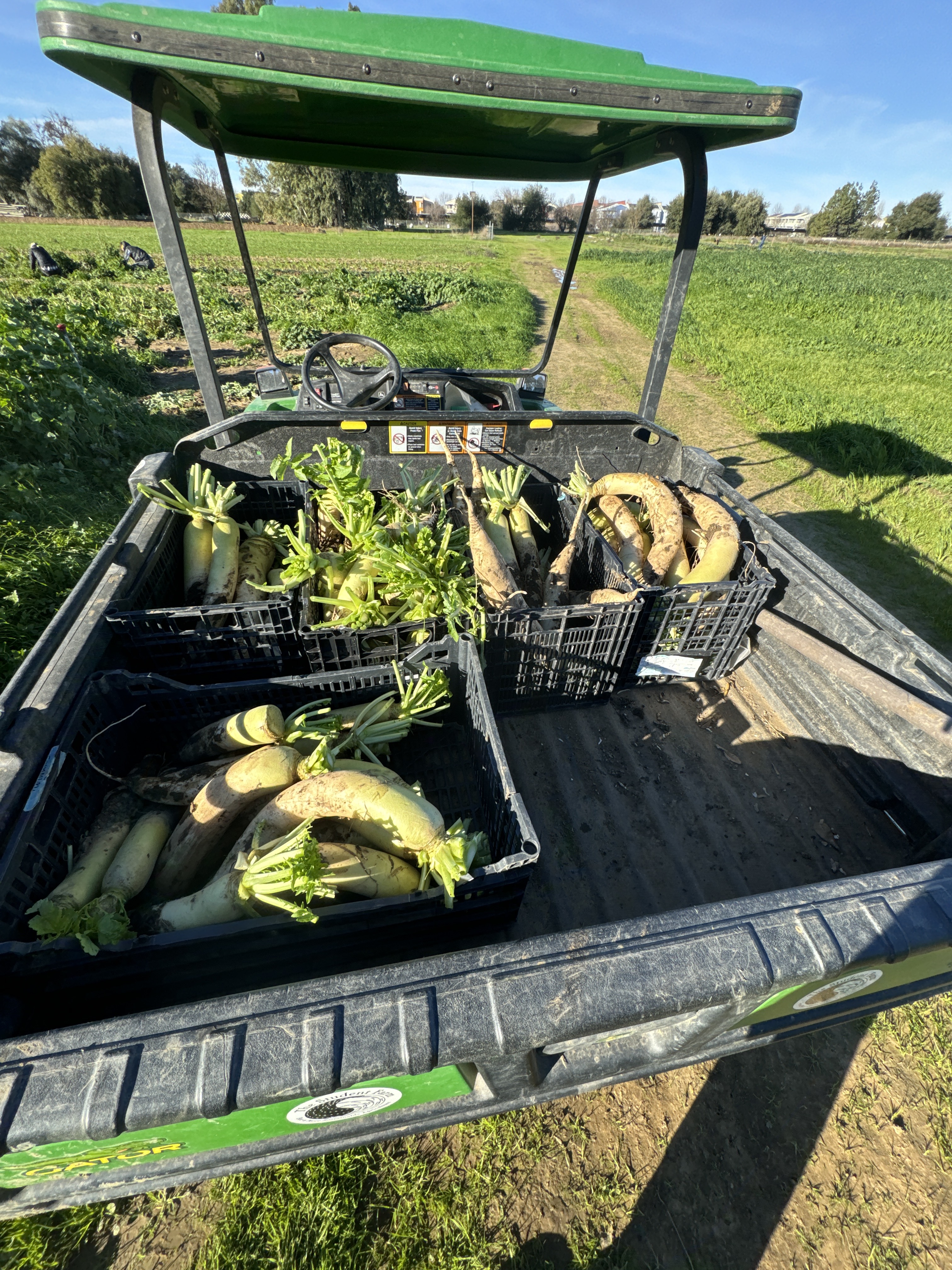
Emma says that she has always had a pessimistic perspective around labor. “Seeing the way my parents grew up, I know we do have to do it, but growing up, I [thought], it would be so nice if my parents got what they deserved and that kind of transferred into the way I think about work.”
At times Emma did not “feel like a good representation of an Asian American in agriculture” because she was pessimistic about it. She believes a better perspective would be from someone who is more happy about the plants, and more happy about the time they are spending in agriculture. But of her time in agriculture so far, her reality has been that she’s spent more of it upset. Emma does not want to give up agriculture, and retrospectively, she thinks these feelings came from a lack of support and a loss of confidence- which made her struggle to be hopeful about a future in agriculture.
When it has weighed heavily on her that she is an Asian American and food systems can be very white spaces, she has thought, "If I'm going to work in agriculture, I'm just going to go back to Vietnam. But that was already a hard enough experience,” she said. However, these feelings are not what she would want for others. So one of her goals coming into this year is to help others foster a love for agriculture, and kindness in the spaces they grow.
Sustainable agriculture in practice on her uncle's farm
One of Emma’s goals is to learn more skills to realistically be able to help run a small farm like her uncle’s and has been seeking answers. Sustainable agriculture practice for small farms looks different from bigger farms, and it’s also very different for livestock production, she explained; the impacts of a water tax will hit hard if raising a cow or any ruminant.
“It's too much to work through, and we just don't have the skillsets, which is why I went to college to study this. But I don't think I found that place that would give me the skill set to do so, because I looked to the student farm to do that. So I think what really would help is a place or a person who could, teach me these things, which sounds like an extension worker, but I honestly don't like the idea of extension work, because...whether or not [I] finish this project is not [their] deal, because [they are] going to be gone in three months and move on to the next project, the next farm. But it is someone who would be genuinely dedicated to having you; I think that's lost with extension work [being a job].” She also wishes in general that she could do things at work without the way jobs that can take the soul out of things. “Bureaucracy makes me not want to do anything,” she said.
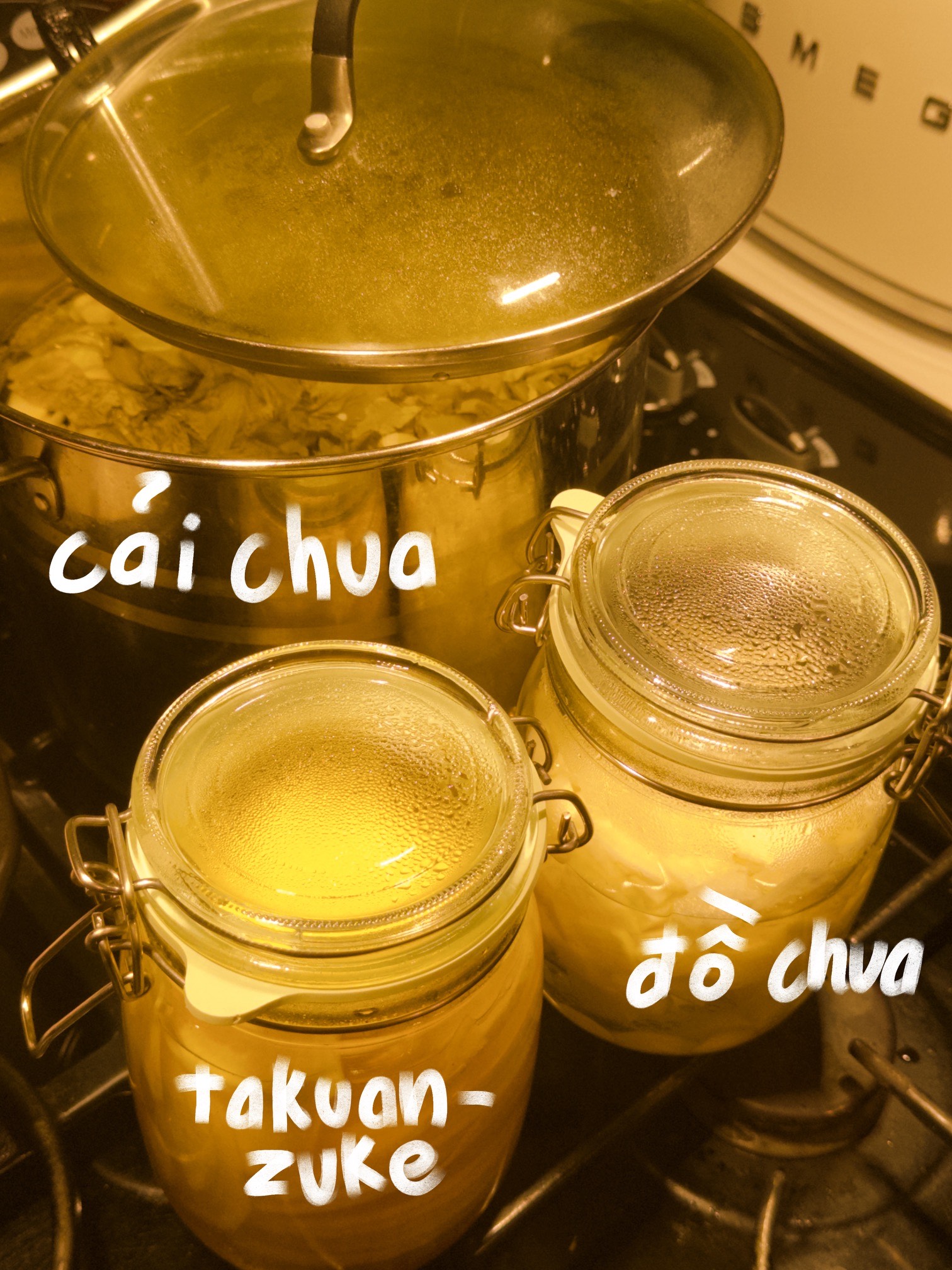
Emma would like to see more community networks between farms and examples like Community Alliance with Family Farmers and their history have given her hope. She says that community networks with farms is something lost in her area, in Canada, referring to her uncle’s farm, and that she’s witnessed it as a frustrating world to be in, trying to farm and steward land, when it can be experienced at farmers markets that people are in competition with one another because they are trying to make a living and get out of the red. “I think the idea of gathering and sharing ‘This is what I'm having an issue with. You guys also have this issue?’ It sounds so rudimentary, but I feel like that's the way to go forward,” Emma said. She thinks that with sustainable agriculture in general, while there needs to be a systematic change in the ways we treat and produce our food, building community networks of support is a way to move forward.
Q: What has been your journey of how your ideas of food systems expanded to where they are now?
"I didn't have a critical consciousness until maybe when I hit Asian American studies on a random day. That was the only time I started looking back on my experiences and reflecting, ‘Wow, that was kind of [big],’ or because my family never really talked about the war. And then I go into these classes, and they're like, ‘The war; The war shaped your entire experience,’ and I'm like, Wait, did it? And then it took a lot of reflection to see that, yes it did.”
She uses an Asian American studies lens to think about agriculture. Now pursuing Asian American studies as a double major, she has had conversations with professors such as Dr. Ga Young Chung who has researched the history of the Korean soybean, and Dr. Natalia Duong, who has researched Agent Orange and toxicity on land and bodies. Meeting these people helped her find confidence and ways to continue her studies in agriculture. As these questions continue, and Emma continues to navigate farming ahead of her, Emma is thinking about graduate school and research in her future career.
Q: If you were to save a seed, what seed or seeds would they be?
“I've been working on Thai chilies at home, actually, and most of these don't grow from seed, but I've [also] been doing a lot of pandan propagation, just for fun, just because I wanted to grow enough to make a syrup.” She’s always had an “outlandish” dream of having a cafe in a farm, where most of the menu items are decided through what’s currently growing at the farm. So that’s why she started growing pandan, to make a pandan latte with the pandan she grew.
